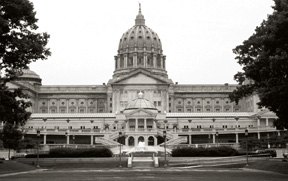Chronicling/An ongoing series highlighting University of Pittsburgh history

Aug. 23, 1966—Some 100 people, most of them from Pittsburgh, crowd into Gov. William Scranton’s office in Harrisburg for the ceremonial signing of a Pennsylvania House of Representatives bill making Pitt a state-related university. Among the state legislators instrumental in passing the bill is Rep. K. Leroy Irvis, a Pitt alumnus (LAW ‘54) who would go on to be elected Pennsylvania’s Speaker of the House—the first African American speaker of a state house in the nation since Reconstruction.
Under the terms of the agreement (still in effect), Pitt remains legally a private institution, the Commonwealth increases its contributions to the University’s annual budgets, and Pitt becomes eligible for General State Authority (GSA) construction grants in addition to gaining the power to issue tax-exempt bonds to finance new construction ineligible for GSA support.
In return, the Commonwealth gains a minority representation on Pitt’s Board of Trustees as well as “the services of a state university in educating its young people…without the huge capital investment that would have been required to build such an institution, as had once been contemplated,” according to Robert C. Alberts’ Pitt: The Story of the University of Pittsburgh 1787-1987 (University of Pittsburgh Press, 1986).
Other Stories From This Issue
On the Freedom Road

Follow a group of Pitt students on the Returning to the Roots of Civil Rights bus tour, a nine-day, 2,300-mile journey crisscrossing five states.
Day 1: The Awakening
Day 2: Deep Impressions
Day 3: Music, Montgomery, and More
Day 4: Looking Back, Looking Forward
Day 5: Learning to Remember
Day 6: The Mountaintop
Day 7: Slavery and Beyond
Day 8: Lessons to Bring Home
Day 9: Final Lessons

